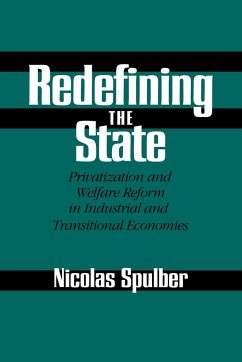Professor Spulber traces the role of the state in the West and East for more than two centuries.
Redefining the State examines in historical perspective the changes of the role of the state with regard to public ownership and the scope of welfare in the main industrial and transitional economies. These changes have given rise to illuminating debates on the state's size, range, and function, and have involved important transformations concerning the boundaries between the public and private sector, the forms and extent of privatization, and the nature and content of public welfare. These debates and transformations are of critical importance to understanding the actual and potential scope of the state in any economy.
Review quote:
"I know of no other work of scholarship that takes on this topic with such scope, magnitude, impartiality, and historical breadth. The author's approach is both theoretical and empirical, and the author presents a non-ideological and dispassionate analysis on a subject on which most people disagree. What is remarkable is Spulber's ability to carry major trends through the late 1990s - a feat that requires careful evaluation of current non-scholarly writings. Spulber's is one of the best explanations of events in transition Russia. I think this book will find its audience among economic historians, students of comparative economics, and general economists, historians, and political scientists."
Paul Gregory, University of Houston
"This excellent book establishes an original and unusual connection between welfare reform and the dismantling of state enterprise, as well as the limitation of government function at all levels, as forms of the general phenomenon of downsizing of the state. It is impressively thorough and rich with evidence and general information; it has great topicality and immediate policy relevance."
D. Mario Nuti, University of Rome, `La Sapienza' and the London Business School
"The importance of the two issues - transition in the East, the downsizing of the state in the West - this work addresses need not be stressed. A large literature is dedicated to each of them. Nicolas Spulber's book is special, however, inasmuch as it considers the two sets of issues in parallel and under a perspective which is mainly historical. I think this is a most welcome addition to the available literature."
Pierre Salmon, University of Bourgogne
"If you're looking for a crisp overview of the role of the state in the West and the East over two centuries, this book is a great place to begin. And if you want to dig deeper in any area, just follow the author's up-to-date and comprehensive citations."
Ravi Ramamurti, Business History Review
Table of contents:
Preface; Part I. Rationale for the State's Expansion: 1. Public ownership and welfare; 2. An all-encompassing party-State; Part II. Methods of Remodelling the State: 3. Limiting the State's size and scope; 4. Restructuring the State's foundations; Part III. Comparisons within Broader Frameworks: 5. Options and outcomes in the industrial economies; 6. Options and outcomes in the transitional economies; Part IV. Outlook for the Twenty-First Century: 7. Contraction vs. expansion of the scope of the State; Notes; Index.
Hinweis: Dieser Artikel kann nur an eine deutsche Lieferadresse ausgeliefert werden.
Redefining the State examines in historical perspective the changes of the role of the state with regard to public ownership and the scope of welfare in the main industrial and transitional economies. These changes have given rise to illuminating debates on the state's size, range, and function, and have involved important transformations concerning the boundaries between the public and private sector, the forms and extent of privatization, and the nature and content of public welfare. These debates and transformations are of critical importance to understanding the actual and potential scope of the state in any economy.
Review quote:
"I know of no other work of scholarship that takes on this topic with such scope, magnitude, impartiality, and historical breadth. The author's approach is both theoretical and empirical, and the author presents a non-ideological and dispassionate analysis on a subject on which most people disagree. What is remarkable is Spulber's ability to carry major trends through the late 1990s - a feat that requires careful evaluation of current non-scholarly writings. Spulber's is one of the best explanations of events in transition Russia. I think this book will find its audience among economic historians, students of comparative economics, and general economists, historians, and political scientists."
Paul Gregory, University of Houston
"This excellent book establishes an original and unusual connection between welfare reform and the dismantling of state enterprise, as well as the limitation of government function at all levels, as forms of the general phenomenon of downsizing of the state. It is impressively thorough and rich with evidence and general information; it has great topicality and immediate policy relevance."
D. Mario Nuti, University of Rome, `La Sapienza' and the London Business School
"The importance of the two issues - transition in the East, the downsizing of the state in the West - this work addresses need not be stressed. A large literature is dedicated to each of them. Nicolas Spulber's book is special, however, inasmuch as it considers the two sets of issues in parallel and under a perspective which is mainly historical. I think this is a most welcome addition to the available literature."
Pierre Salmon, University of Bourgogne
"If you're looking for a crisp overview of the role of the state in the West and the East over two centuries, this book is a great place to begin. And if you want to dig deeper in any area, just follow the author's up-to-date and comprehensive citations."
Ravi Ramamurti, Business History Review
Table of contents:
Preface; Part I. Rationale for the State's Expansion: 1. Public ownership and welfare; 2. An all-encompassing party-State; Part II. Methods of Remodelling the State: 3. Limiting the State's size and scope; 4. Restructuring the State's foundations; Part III. Comparisons within Broader Frameworks: 5. Options and outcomes in the industrial economies; 6. Options and outcomes in the transitional economies; Part IV. Outlook for the Twenty-First Century: 7. Contraction vs. expansion of the scope of the State; Notes; Index.
Hinweis: Dieser Artikel kann nur an eine deutsche Lieferadresse ausgeliefert werden.








